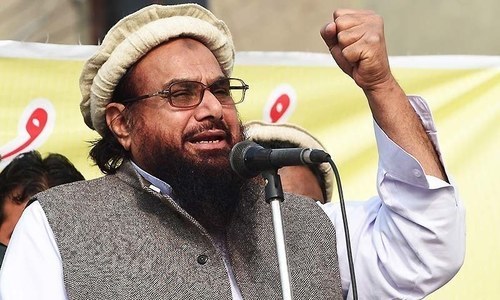Addressing a sermon at Lahore's Jamia Masjid Al Qadsia a day after walking free, Jamaatud Dawa (JuD) leader Hafiz Saeed said on Friday that he is "fighting for the freedom of Pakistan and Kashmir."
The JuD chief claimed that he had been placed under house arrest for fighting for the rights of Kashmiris and suggested that the country's leaders are making decisions under external pressure.
"If the leaders of the Pakistan start making their own decisions, they will no longer face external pressure," the leader of the proscribed group said.
The JuD chief said that former prime minister Nawaz Sharif was ousted because he had betrayed the people of Kashmir. He further alleged that India is involved in terrorist activities in Pakistan.
"Peace cannot be established in Pakistan if terrorists such as Kulbashan Jadhav continue to enter the country," Saeed said, referring to the Indian spy who was sentenced to death by a Pakistani military court in April on charges of espionage and terrorism.
Washington 'deeply concerned'
Also on Friday, Washington said it was “deeply concerned” with the release of the JuD chief, who carries a bounty of $10 million announced by the US for his role in terror activities.
"Lashkar-e-Taiba is a designated Foreign Terrorist Organization responsible for the death of hundreds of innocent civilians in terrorist attacks, including a number of American citizens," US State Department spokesman Heather Nauert said, referring to the party which is considered to be a front for JuD.
“The Pakistani government should make sure that he is arrested and charged for his crimes," Nauert added.
A day earlier, India had slammed the release of the JuD chief, whose 300-day house arrest 30-day detention expired on Thursday at midnight.
India claims that the JuD head was the mastermind of 2008 Mumbai attacks that left 166 people dead. Ten gunmen, including Ajmal Kasab, had gone on a killing spree in the city after reaching the city from Karachi by sea, India says.
A spokesperson for the JuD rubbished the criticism in a statement issued Friday evening, saying that: "Hafiz Saeed is an advocate of peace and a philanthropist."
He condemned "American concern" over Saeed's release, insisting that Pakistan's judiciary is independent and any attempt to question its decisions is equivalent to interfering in the country's internal matters.
The Foreign Office issued a similarly worded response to India's 'concerns', stating that: "The courts in Pakistan, pursuant to their constitutional duty, are determined to uphold rule of law and due process for all citizens of Pakistan."
"Legal processes are anchored in rule of law, not dictates of politics and posturing," the FO's spokesperson said.
"It is in the interest of all states to speak and act in a manner that is consistent with the imperatives of adhering to rule of law at the national and international levels."
Brushing aside insinuations that Hafiz Saeed's release was akin to support of terrorist outfits, the FO said: "Pakistan’s resolve, actions and successes in the fight against terrorism, terrorist violence and terrorists is unmatched in the world. Pakistan condemns and opposes all forms of terrorism by any individual or group. Pakistan also opposes and condemns acts of terrorism inside Pakistan and elsewhere by India, which claims to be a champion of democracy, and international law."













































